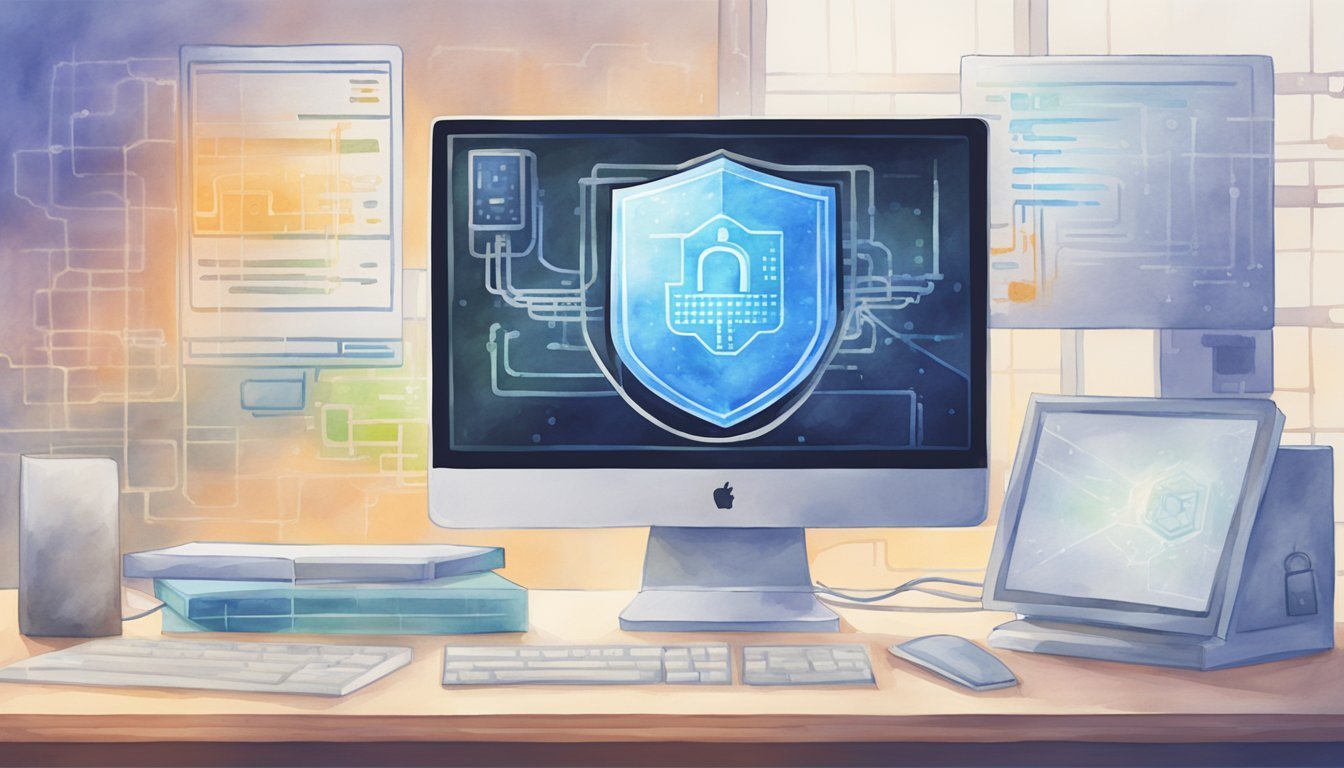7 Advanced Cybersecurity Training for IT Specialists: Enhancing Digital Defense Skills

Cybersecurity is a fast-changing field.
IT specialists need to stay up-to-date with the latest threats and defense techniques.
Advanced training can help you sharpen your skills and protect your organization better.

You can boost your cybersecurity expertise with specialized courses and certifications. These programs cover topics like network security, risk management, and ethical hacking.
By learning advanced concepts, you’ll be ready to tackle complex security challenges in today’s digital world.
1) Network Penetration Testing

Network penetration testing is a key skill for IT specialists.
It helps find weak spots in computer systems before hackers do.
You’ll learn how to test networks safely and legally.
This training teaches you to think like an attacker.
You’ll use special tools to find gaps in security.
The course covers how to scan networks and find open ports.
You’ll practice getting into systems without permission.
Then you’ll learn to fix the problems you find.
Advanced penetration testing courses build on basic skills.
They teach you to write your own hacking tools.
You’ll also learn about more complex attacks.
Some programs mix classroom lessons with hands-on practice.
You might work on fake networks set up just for training.
This lets you try attacks without breaking real systems.
Many courses end with a test. Passing can earn you a certificate.
This shows employers you know how to find and fix security problems.
Network penetration testing training often covers wireless networks too.
You’ll learn how to break into Wi-Fi and test its security.
As you advance, you can learn about testing cloud systems.
This is important as more companies use cloud services.
2) Advanced Malware Analysis
Advanced malware analysis is a crucial skill for IT specialists.
It helps you uncover hidden threats and protect systems from sophisticated attacks.
Advanced malware analysis techniques focus on examining complex malicious code.
You’ll learn to identify and understand how advanced threats operate.
These courses teach you to use specialized tools and methods.
You’ll gain skills in reverse engineering and code analysis to dissect malware.
Static analysis is a key component.
It allows you to examine malware without running it, reducing risks to your systems.
Dynamic analysis involves running malware in a controlled environment.
You’ll observe its behavior and network interactions to understand its full capabilities.
Advanced topics include combating anti-analysis techniques.
You’ll learn how to overcome methods malware uses to avoid detection and analysis.
Packed and armored executables present unique challenges.
These courses teach you strategies to unpack and analyze such complex malware.
You’ll also study malware that targets virtual machines.
This knowledge is vital as many analysis environments use virtualization.
By mastering these skills, you’ll be better equipped to handle cybersecurity incidents.
You can provide more accurate threat assessments and develop effective countermeasures.
Remember, malware is constantly evolving.
Continuous learning and practice are essential to stay ahead of new threats.
3) Incident Response & Forensics
IT specialists can boost their skills with incident response and forensics training.
These courses teach you how to handle cyber attacks and investigate digital evidence.
You’ll learn to create protection plans and respond quickly to security breaches.
This helps minimize damage and recover systems faster.
Advanced forensics techniques are a key part of these programs.
You’ll discover how to collect and analyze digital clues from computers and networks.
Many courses cover both insider threats and malware attacks.
You’ll gain skills to spot suspicious behavior and trace the source of security issues.
Network forensics is often included too.
This teaches you to examine network traffic for signs of intrusion or data theft.
Some programs also touch on smartphone and Mac forensics.
These skills are useful as more devices connect to company networks.
By taking incident response and forensics courses, you’ll be better prepared to protect your organization.
You’ll know how to act fast when security incidents occur and gather evidence to prevent future attacks.
4) Secure Coding Practices

Secure coding practices are a crucial part of cybersecurity training for IT specialists.
You’ll learn how to write code that’s resistant to attacks and vulnerabilities.
In this training, you’ll focus on implementing a secure software development lifecycle.
This approach helps you build security into your applications from the start.
You’ll study common vulnerabilities and how to prevent them.
This includes learning about input validation, proper error handling, and secure data storage.
The training will cover best practices for different programming languages.
You’ll learn specific techniques for C/C++ and Java, two widely used languages in software development.
You’ll also explore the OWASP Top Ten, a list of the most critical web application security risks.
Understanding these risks helps you write more secure code.
Threat modeling is another key topic.
You’ll learn how to identify potential threats to your software and design appropriate safeguards.
The training will teach you about cryptography basics.
You’ll learn how to properly implement encryption and protect sensitive data.
Code review techniques are also covered.
You’ll practice finding security flaws in existing code and learn how to fix them.
By the end of this training, you’ll have the skills to write more secure code.
This knowledge helps protect your organization’s software from potential attacks.
5) Cloud Security Strategies

Cloud security is a critical part of modern IT.
You need to know how to protect data and systems in the cloud.
Cloud security training can help you learn key strategies.
These include securing cloud infrastructure, platforms, and apps.
One important strategy is understanding common cloud weaknesses.
You should know how to spot and fix misconfigurations that could lead to breaches.
Developing secure cloud design strategies is also crucial.
This means planning security from the start, not as an afterthought.
AWS security is a key area to focus on.
AWS is a major cloud provider, so knowing its security features is valuable.
You should also learn about securing containers and Kubernetes.
These technologies are widely used in cloud environments.
Data protection in the cloud is another vital topic.
You need to know how to encrypt data, manage access, and ensure compliance.
Network security in cloud environments is different from traditional networks.
Learning cloud-specific network security techniques is important.
Monitoring and logging in the cloud are essential for detecting threats.
You should know how to set up effective monitoring systems.
Lastly, incident response in the cloud requires special skills.
You need to know how to handle breaches and other security events in cloud environments.
6) Advanced Threat Intelligence
Advanced threat intelligence training is crucial for IT specialists.
It helps you stay ahead of cybercriminals and protect your organization’s assets.
Cyber threat intelligence focuses on understanding the human threat behind malware and other attacks.
You’ll learn to analyze adversary tactics and anticipate their next moves.
In these courses, you’ll explore advanced methodologies and tools.
You’ll gain skills to identify and assess complex threats more effectively.
You’ll learn to use frameworks like the Cyber Kill Chain and MITRE ATT&CK.
These help you map out attack patterns and improve your defense strategies.
Advanced threat intelligence training teaches you to leverage existing data sources.
You’ll reduce false positives and focus on real threats to your systems.
You’ll practice using cutting-edge threat intelligence platforms.
These tools help you collect, analyze, and share threat data across your organization.
The training will cover techniques for attributing attacks to specific threat actors.
This knowledge helps you tailor your defenses to counter known adversaries.
You’ll also learn to create actionable intelligence reports.
These reports help decision-makers understand threats and allocate resources effectively.
By mastering advanced threat intelligence, you’ll become a valuable asset to your cybersecurity team.
You’ll help guide strategic decisions and strengthen your organization’s security posture.
7) Red Team Operations
Red Team Operations training is a crucial part of advanced cybersecurity education.
It teaches you how to think and act like real attackers.
This helps you find weak spots in an organization’s defenses.
In this training, you’ll learn to plan and carry out simulated attacks.
You’ll use the same tools and methods as real hackers.
This hands-on approach gives you practical experience in a safe environment.
Advanced Red Team Operations courses often use realistic scenarios.
You might set up your own lab to practice in.
This lets you try out different attack strategies without risk.
You’ll also learn about adversary emulation.
This means copying the tactics of known threat groups.
It helps you test defenses against real-world attacks.
Red Team training covers more than just technical skills.
You’ll learn about planning operations and working as a team.
These skills are key for successful Red Team exercises.
The goal of Red Team training is to improve overall security.
By finding and exploiting weaknesses, you help organizations fix them.
This makes their defenses stronger against real attacks.
Red Team certification programs can boost your career in cybersecurity.
They show employers you have advanced skills in offensive security.
This can lead to exciting job opportunities in the field.
The Importance of Advanced Cybersecurity Training for IT Specialists

Advanced cybersecurity training is crucial for IT specialists to protect against evolving threats and build essential skills.
It keeps you ahead of cyber criminals and boosts your ability to safeguard critical systems and data.
Understanding the Evolving Threat Landscape
Cyber threats change rapidly.
New attack methods emerge often.
As an IT specialist, you need to stay current on the latest risks. Advanced cybersecurity training helps you:
• Spot new types of malware and attacks
• Learn about zero-day vulnerabilities
• Understand social engineering tactics
You’ll gain skills to analyze security needs for networks.
This includes both new and existing systems.
The training covers how to set up end-to-end security across an organization.
You’ll also learn to use automation for risk management.
This saves time and improves your response to threats.
Enhancing IT Staff Competency
Advanced training boosts your skills as an IT pro.
It helps you think like a hacker to better defend systems.
You’ll learn to:
• Break down malware to understand how it works
• Use security frameworks more effectively
• Set up zero-trust solutions for stronger protection
The training improves your problem-solving skills for complex security issues.
You’ll be ready to handle tough challenges in your daily work.
It also prepares you for growth in your career.
Many jobs need experts in cybersecurity.
With advanced training, you can take on roles like:
• Cybersecurity analyst
• Security specialist
• Cybersecurity consultant
These positions often pay well and offer chances to keep learning.
Key Components of Advanced Cybersecurity Training

Advanced cybersecurity training focuses on developing high-level skills to protect against sophisticated threats.
It emphasizes cutting-edge techniques for threat detection and effective incident response strategies.
Advanced Threat Detection and Mitigation
Advanced threat detection involves using complex tools and techniques to identify and stop sophisticated cyber attacks.
You’ll learn to use AI-powered security systems that can spot unusual patterns in network traffic.
These systems help you catch threats that traditional methods might miss.
You’ll also study how to set up honeypots.
These are fake systems that lure attackers, letting you study their methods.
By understanding how attackers think, you can better protect your real systems.
Another key skill is threat hunting.
This means actively looking for signs of attacks, not just waiting for alarms.
You’ll learn to analyze logs and network data to find hidden threats.
Incident Response and Management
When a security breach happens, you need to act fast.
Incident response training teaches you how to handle attacks quickly and effectively.
You’ll learn to create detailed response plans that spell out what each team member should do.
Automating risk processes is a crucial part of this training.
You’ll set up systems that can automatically detect and respond to certain types of attacks.
This helps you react faster and more consistently.
You’ll also practice running simulated attacks.
These drills help you test your response plans and find ways to improve them.
By the end, you’ll be ready to lead your team through real security crises.
Frequently Asked Questions

IT specialists seeking advanced cybersecurity training often have questions about certifications, qualifications, and career prospects.
The answers below provide key insights to help you make informed decisions about your cybersecurity education and career path.
What are the top cyber security certifications for IT professionals?
The CISSP (Certified Information Systems Security Professional) is a highly respected certification for experienced security professionals.
Other valuable certifications include CEH (Certified Ethical Hacker), CompTIA Security+, and CISM (Certified Information Security Manager).
These certifications cover various aspects of cybersecurity, from ethical hacking to information security management.
What qualifications are required to enroll in advanced cyber security training?
Most advanced cybersecurity courses require a background in IT or computer science.
You typically need basic knowledge of networking, operating systems, and programming languages.
Some programs may require specific certifications or work experience in the field.
Check the prerequisites for each course you’re interested in.
How does the Stanford Advanced Cyber Security Program compare to other similar courses?
The Stanford Advanced Cyber Security Program is known for its rigorous curriculum and focus on practical skills.
It covers topics like network security, cryptography, and secure systems design.
Compared to other programs, Stanford’s offering often stands out for its academic reputation and connections to Silicon Valley tech companies.
Which free online cyber security courses are best suited for IT specialists aiming to advance their skills?
Coursera offers several free cybersecurity courses that are well-suited for IT specialists.
These include introductions to ethical hacking, network security, and cryptography.
Other platforms like edX and Cybrary also provide free courses on topics such as malware analysis and incident response.
What is the expected salary range for IT specialists with high-level cyber security certifications?
However, this range can vary based on location, experience, and specific role.
Senior positions or those in high-demand areas like cloud security or penetration testing may command even higher salaries.
How does Fortinet training contribute to an IT specialist’s expertise in cybersecurity?
Fortinet training focuses on network security appliances and software.
It provides hands-on experience with firewalls, intrusion prevention systems, and secure access solutions.
This training can enhance your skills in network protection and threat detection, making you more valuable to employers using Fortinet products.






